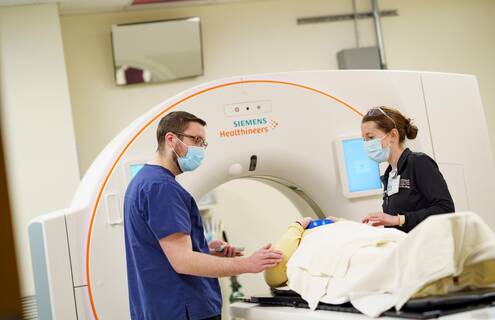
More than 80% of lung cancer cases, if detected early, are curable. And yet lung cancer remains the leading cause of cancer deaths in the United States. Why? Perhaps because only 6% of eligible individuals nationwide receive screening. This disparity is even greater in rural areas like northern New England, where barriers to access often get in the way of screening.
To address this issue, a team at Dartmouth Health and the Geisel School of Medicine has worked to increase screening rates in rural New Hampshire and Vermont. Co-led by Karen Schifferdecker, PhD, MPH, a medical anthropologist and associate professor at The Dartmouth Institute for Health Policy & Clinical Practice, the project involved new patient communications strategies and a provider toolkit to boost awareness, make it easier to identify who is eligible for screening, and support patient management.
The team’s work was made possible by The Susan & Richard Levy Health Care Delivery Incubator, a joint venture between The Dartmouth Institute and Dartmouth Health. By funding innovative healthcare delivery solutions, the Incubator enables researchers to think creatively, recognizing that even small changes can have an outsized impact—which is exactly what the lung cancer screening project set out to accomplish.
Breaking down barriers
First, the team sought to understand barriers preventing eligible people from getting screened and found that tobacco users often face educational and resource deficiencies. They also found that public stigma surrounding smoking-related lung cancer contributes to low screening rates.
Early detection is important
Each year more people lose their lives to lung cancer than all of these forms of cancer combined. These losses are because, most of the time, lung cancer is found too late and has spread. Early, routine screening saves lives.
Learn the answers to frequently asked questions about lung cancer screening.
The team then created an educational patient brochure featuring inclusive and non-stigmatizing imagery and language, such as referring to “lung health” instead of “lung cancer” and renaming the “Pulmonary Nodule Clinic” to the “Lung Health and Pulmonary Nodule Clinic”—a simple yet effective change that made it less intimidating for patients. They also reframed website messaging to be clearer and involved the perspective of a patient advisor who survived lung cancer due to early screening.
The new friendly approach helps to take the sense of blame off the individual and focuses instead on understanding nicotine addiction.
Boosting providers
With improvements to the electronic medical records system also part of this project, providers are now better equipped with resources and training on lung cancer screening guidelines, shared decision-making, tobacco treatment counseling and their own patients’ smoking history.
By addressing rural residents’ unique challenges, this team has enabled patients to be more informed and seek the right care for themselves. In addition, the approach was designed to be replicated in rural areas across the country, serving as a model for improving preventive care access in underserved areas.
Read more about the considerable impact the lung cancer screening project is already having.